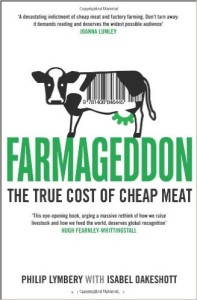Book Review: “Farmageddon” by Philip Lymbery
by Jan
 As the title suggests, this book is an investigation and an indictment of industrial farming. Lymbery starts by explaining what Rachel Carson wrote about in Silent Spring in 1962. The deterioration of the environment, the mistreatment of animals, and the proliferation of chemicals have not stopped since then. Remember mad cow disease and the horsemeat scandal? Since then farming has deteriorated even more.
As the title suggests, this book is an investigation and an indictment of industrial farming. Lymbery starts by explaining what Rachel Carson wrote about in Silent Spring in 1962. The deterioration of the environment, the mistreatment of animals, and the proliferation of chemicals have not stopped since then. Remember mad cow disease and the horsemeat scandal? Since then farming has deteriorated even more.
Lymbery visits many countries and reports on various food production operations.
He observed the lack of bees in Californian almond orchards. Wildlife is being destroyed: bees have to be imported from Australia in order to pollinate trees because the bees have been killed by chemicals.
He had to hold his nose outside enormous industrial diaries, and saw cows suffer because their udders were so full of milk.
In Taiwan he observed an “organic” egg operation where chooks were stacked and starved.
He observed that the water in Chesapeake Bay is polluted by the outflow from a poultry operation.
Similar in Mexico, where near a large industrial pig farm, he saw large pools and streams of polluted stinking water. He also spoke to locals about this.
In Argentina, he saw vast areas of farmland which grow grains and soya beans, exported to feed animals in CAFOs (Concentrated Animal Feeding Operations – ie. massive feedlots) because they cannot roam free and eat grass. These cereals could be feeding humans in poorer countries.
In Scotland he saw a fish farm at Loch Maree. The trout have disappeared, replaced by large salmon farms, destroying the local marine ecology.
The result of all this is cheap meat and fish. But at a helluva price.
For example, CAFOs where animals are cruelly overcrowded, creating the need for antibiotics, and consequent antibiotic-resistant superbugs. The antibiotics and vet fees are not cheap.
There is the overuse of organophosphates in the soil, creating polluted waterways. These chemicals are neither cheap nor healthy.
Why is all this allowed to continue? It’s probably because companies and their shareholders profit from it, and government legislation is weak. And we consumers are complicit because some of us are disconnected from what we eat and where it comes from. This is equivalent to putting our fingers in our ears because we don’t want to know. The postcard view of a bucolic idyll is fine thanks very much! The result is poor quality food, scandalous food waste, diabetes and obesity etc.
Lymbery has some suggestions about what we could do: eat a bit less meat, rear what we need on outdoor pasture (imagine that!), feed fish to people instead of to other fish. We could feed pigs and poultry on food waste from our kitchens and restaurants. We could keep the land healthy by rotating crops and move the animals around so that paddocks can regrow using the animal dung as manure for the soil, similar to Joel Salatin on Polyface Farm.
But changing the way we think, farm, shop, cook, waste and eat seems to be too hard! When it’s actually not that hard at all.